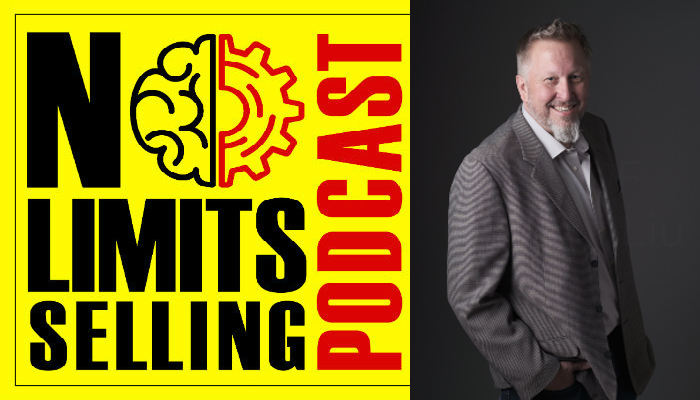4 Useful Tactics on Becoming "The Certifiable Sales Genius”
On Episode 148 of The No Limits Selling Podcast, we have Joe Ingram, The Sales Genius | Speaker | Author | Podcast Host | Car Sales Trainer. In this episode, Joe shares with us 1 useful tactics on becoming the certifiable sales genius.
Helping Business owners convert virtual prospects into paying customers. With over 3 decades of sales and marketing success under his belt, ] he has doubled sales revenue for companies in the Automotive, Software, Chiropractic, Dentistry, Mortgage, and Real Estate Industries.
Joe can help any sales organization to maximize their lead-to-sales conversions by removing the "trust potholes" that are inherently damaging your road to the sale.

Contact Joe:
[EDITOR’S NOTE: This podcast is sponsored by No Limits Selling. It is a fun, fast-paced podcast that delivers hard-fought business advice that you can implement today to improve your sales and performance]
Interested In Our Real Estate Coaching Services? Explore Our Website: Link
Feeling Not Well Today? You Can Use Our Mindset Boosters App To amp Up Your Mood: Link
Find us on Social Media:
LinkedIn | Facebook community | Instagram
Like what do you listen to? Subscribe to our podcast!
Ready to become fearless? We can help you become fearless in 60 days so you accomplish more in your career Schedule A 15 min Call with Umar
Summary
Introduction and Background of Joe Ingram
The podcast begins with an introduction of Joe Ingram, a renowned sales genius, speaker, author, podcast host, and car sales trainer. Joe shares his background, detailing his journey from a humble beginning to becoming the certifiable sales genius. He talks about his early struggles, the lessons he learned, and how these experiences shaped his sales techniques and strategies.
Joe's Approach to Sales
Joe Ingram discusses his unique approach to sales, which is centered around understanding the customer's needs and building strong relationships. He emphasizes the importance of empathy, active listening, and effective communication in the sales process. Joe believes that the certifiable sales genius is not just someone who can close a deal, but someone who can create a positive experience for the customer.
The Importance of Mindset in Sales
In this section, Joe delves into the psychological aspects of sales. He talks about the importance of having a positive mindset and a strong belief in the product or service being sold. According to Joe, self-confidence and a positive attitude can significantly impact a salesperson's performance and success on their journey to becoming the certifiable sales genius.
Joe's Sales Techniques and Strategies
Joe shares some of his most effective sales techniques and strategies. These include understanding the customer's buying behavior, using persuasive language, and leveraging the power of storytelling. He also discusses the importance of follow-up and maintaining a long-term relationship with the customer.
The Role of Training in Sales
Joe highlights the importance of continuous learning and training in sales. He believes that even the most experienced salespeople can benefit from regular training to keep their skills sharp and stay updated on the latest sales trends and techniques to become the certifiable sales genius. Joe also shares some insights from his own experience as a car sales trainer.
Conclusion
In this insightful podcast, renowned sales expert Joe Ingram shares his journey from humble beginnings to becoming a the certifiable sales genius, emphasizing the importance of understanding customer needs, building strong relationships, and maintaining a positive mindset. He provides valuable sales techniques and strategies, such as understanding customer buying behavior, using persuasive language, and the power of storytelling. He underscores the significance of continuous learning and training in sales, even for experienced professionals.
Ingram's final advice for aspiring salespeople is to persist, stay motivated, and strive for constant improvement, with a particular focus on customer-centric sales and empathy. This podcast serves as a comprehensive guide for anyone looking to enhance their sales skills and achieve success in the field.
Questions & Answers
Who is Joe Ingram in the sales industry?
What is Joe Ingram's approach to sales?
How does mindset affect sales according to Joe Ingram?
What are some of Joe Ingram's effective sales techniques and strategies?
Why does Joe Ingram emphasize the importance of training in sales?
What advice does Joe Ingram give to aspiring salespeople?
What can listeners learn from Joe Ingram's sales podcast?
Don’t miss this opportunity to transform your real estate career with one-on-one coaching. As an experienced real estate coach, I, Umar Hameed, am dedicated to helping you unlock your full potential and achieve your real estate goals. To learn more about who am I and my clients ↓
If you’re ready to take the next step, book an appointment with me today and begin your journey toward success in the real estate industry.
